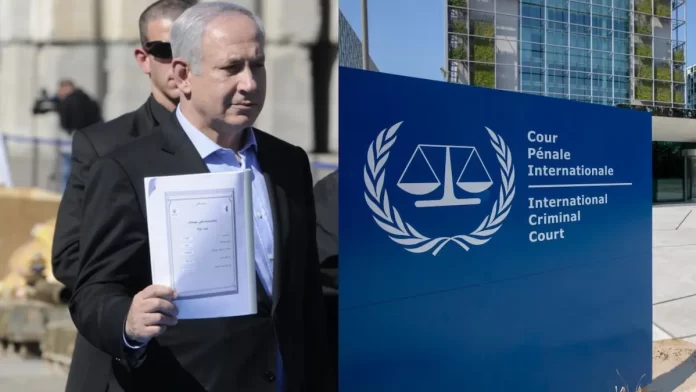In a landmark development, the International Criminal Court (ICC) has issued arrest warrants for Israeli Prime Minister Benjamin Netanyahu, former Defense Minister Yoav Gallant, and Mohammed Deif, the military commander of Hamas, reported BBC.
The warrants, announced by a pre-trial chamber, mark a pivotal moment in the pursuit of accountability for alleged war crimes and crimes against humanity during the recent Israel-Hamas conflict.
What are the Charges?
The ICC has charged Netanyahu and Gallant with multiple crimes, including the use of starvation as a method of warfare and directing attacks against civilians.
It also found reasonable grounds to believe that “each bear criminal responsibility for the following crimes as co-perpetrators for committing the acts jointly with others: the war crime of starvation as a method of warfare; and the crimes against humanity of murder, persecution, and other inhumane acts”, reported BBC.
These charges stem from Israel’s military campaign in Gaza, launched in response to Hamas’s attack on October 7, 2023. Mohammed Deif faces charges of murder, torture, and sexual violence, among others, for his role in the same conflict.
While Israel disputes Deif’s status, claiming he was killed in an airstrike, the ICC has stated that it cannot confirm his death. The ICC has also rebuffed Israel’s challenges to its jurisdiction over the Palestinian territories, emphasizing its authority as a court of last resort.
The prosecutor’s case against the Hamas leader stems from the events of 7 October 2023, when Hamas gunmen attacked southern Israel, killing over 1,200 people and taking hundreds others back to Gaza as hostages.
Israel responded by launching a military campaign aimed at eliminating Hamas in response to the attack, resulting in the reported deaths of at least 44,000 people in Gaza, according to figures provided by the Hamas-run health ministry in the territory.
Reactions and Implications
The warrants have drawn polarized reactions. Netanyahu has condemned the ICC as “antisemitic,” accusing it of undermining Israel’s right to self-defense.
Gallant echoed these sentiments, accusing the court of equating the actions of Hamas with those of Israel. Hamas, on the other hand, has welcomed the warrants against Israeli leaders, calling them an “important historical precedent.”
The United States, a non-member of the ICC, has rejected the court’s decision, highlighting its long-standing opposition to ICC jurisdiction over Israeli and Palestinian actors. In contrast, several European nations have expressed support for the ICC’s actions, with some indicating a willingness to enforce the warrants.
Enforcement Challenges
The effectiveness of these warrants depends heavily on the cooperation of ICC member states, which do not include Israel or its ally, the United States. While EU foreign policy chief Josep Borrell has affirmed that the decision is binding on EU member states, enforcement is far from guaranteed.
Past instances, such as South Africa’s refusal to arrest Sudanese President Omar al-Bashir, illustrate the challenges the ICC faces in executing warrants.
Netanyahu and Gallant’s international travel may be restricted, but immediate prosecution seems unlikely. Countries like Italy and the Netherlands have pledged to comply with the ICC, but a domestic legal process would be required to arrest and extradite any of the accused.
Contested ICC Jurisdiction
The International Criminal Court (ICC) is empowered to prosecute individuals accused of genocide, crimes against humanity, and war crimes, provided these acts occur within the territory of states that are parties to the Rome Statute, its founding treaty.
Although Israel has consistently rejected the ICC’s jurisdiction, the court made a significant ruling in 2021. It determined that it possesses jurisdiction over the occupied West Bank, East Jerusalem, and Gaza. This decision was rooted in the recognition by the United Nations Secretary-General of Palestine as a member state of the ICC.
This jurisdictional claim underscores a broader debate over the ICC’s reach and the contentious question of Palestine’s statehood under international law. While the ICC views its mandate as including Palestinian territories, Israel contests this on the grounds that it is not a party to the Rome Statute and disputes Palestine’s status as a state capable of delegating jurisdiction.
The ruling carries potential implications for accountability and international justice in one of the world’s most enduring conflicts, highlighting the intersection of international law and geopolitical contestations.
The International Criminal Court (ICC) operates as a court of last resort, intervening only when domestic judicial systems are unwilling or unable to genuinely investigate or prosecute grave international crimes. This principle, known as complementarity, ensures that the ICC acts as a safeguard rather than a replacement for national legal mechanisms.
A Precedent in International Law
The ICC’s decision underscores its mandate to hold individuals accountable for the gravest crimes, regardless of political power or status. For Palestinians, the warrants symbolize a glimmer of justice amidst decades of suffering. However, for Israel and its allies, they represent a contentious intrusion into national sovereignty and self-defense.
As the world watches, the ICC’s ability to enforce these warrants will be a critical test of the international legal order’s capacity to address complex conflicts. Whether these actions will lead to accountability or deepen geopolitical divides remains uncertain, but the precedent set by this decision is undeniable.
The pursuit of justice, however, is fraught with both hope and challenge, reflecting the complexities of modern international relations.
Indeed, those who deny God’s signs, kill the prophets unjustly, and kill people who stand up for justice—give them good news of a painful punishment. Quran 3:21
O ye who believe! stand out firmly for Allah, as witnesses to fair dealing, and let not the hatred of others to you make you swerve to wrong and depart from justice. Be just: that is next to piety: and fear Allah. For Allah is well-acquainted with all that ye do. Quran 5.8
It was narrated that Abu Ja’far said: “I was sitting with Suwaid bin Muqarrin, and he said: The Messenger of Allah [SAW] said: “Whoever is killed defending himself against injustice, he is a martyr.” Sunan an-Nasa’i 4096
